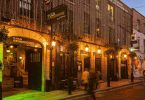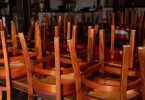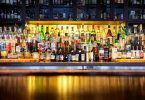Colin Neill — “The pub industry is a national treasure”
After 20 years, the vintners federation in NI has changed its name from the mouthful formerly known as the ‘NI Federation of the Retail Licensed Trade’ to the lower calorie ‘Pubs of Ulster’ in a move not dissimilar to that being contemplated by the VFI.
“We were aware of the long sentence that we had for a name” says Colin Neill, ongoing Chief Executive of the somewhat slimmer Pubs of Ulster, “and it tended to pre-script whatever the conversation was to be about with ‘alcohol’. Also, the old name didn’t represent what our industry does. The more I talked to others, the more I got the same response.
“We needed a change to represent what we do and what the industry is really about. It’s the bigger offer, the whole social experience – live music, food and all that, so that we can reposition the pub in the minds of Government and the public and indeed in the minds of some publicans. What are they offering? We needed to up the quality and up the ante in terms of customer service.”
And so the Executive Committee arrived at Pubs of Ulster.
“It identifies part of our heritage and culture,” says Colin, “We wanted to be proud of that. It might be a modern pub, a café bar or a nightclub but at the end of the day all have one core commonality, a pub at heart with a pub licence. The pub industry is a national treasure. It kind of identifies who we are.
“The Irish pub experience is world-famous and geographically we used the ‘Ulster’ term to identify ourselves within that offering in that we provide our own unique offering as well. We’re about Hospitality, Leisure and Tourism – it’s in our letterhead. It’s only a name if we don’t reinforce the message.
“If you take it that the Food & Drinks sector is the largest-grossing tourism sector in NI, we are it!”
While the logo remains the same (and legally it remains a Federation), he’s still taking feedback about the name change, believing it to have been positively received on the whole.
“We wrote to the entire industry plus key individuals and Government and we’ve been written back to by some members of the Assembly, councillors etc from all political persuasions to say that this was a very positive move.
“The challenges for us now are to keep reinforcing who we are and to get the name out there. It moves us away from the idea that all we’re about is alcohol.”
That’s important to this £1 billion economy and to the 35,000 working in the 1,400 to 1,500 pubs there.
“This should be an exact figure but the Government cannot tell us how many pubs there actually are — so we’re compiling it ourselves,” says Colin, who’ll be watching all those figures carefully.
If you take out that pubs there and here operate under different jurisdictions, they’re similar in that both have rising overheads and falling footfall and the legislations under which both operate are becoming more harmonised.
“There are very few differences when you drill down to it” he says, “there’re a lot of independently-owned pubs, rural pubs and rural issues in terms of getting people into them.”
Publicans there believe they’ve suffered more from below-cost selling through having to cope with a larger number of discounters and supermarkets per head.
But price isn’t the issue so much as the social consequences of cheap alcohol being available, says Colin who’d also like to see the pub trade secured as the ‘responsible industry’.
“People arrive at the pub pre-loading and then we get blamed for their anti-social behaviour when we don’t let them in. The Government needs to change the tax model if they’re to tackle the drinking-at-home issue. We pay rates on turnover here. We’re the only industrial/commercial organisation that does so. As a result, our rates are 30 per cent higher than normal. So in a way, we’re already paying our ‘social levy’.”
In contrast, multiples, with 70 per cent of NI’s liquor business, pay normal shop rates (or even lower as many are out of town locations).
“If the rating model were to be changed so that the multiples were paying according to volume of alcohol sold, this would be a win-win situation as it would put extra pressure on supermarkets to up the price, getting the Government a revenue stream to spend on health, on the social impact of drinking at home and on the street. In short, the same social levy the pubs already pay.”
Sky TV bases its fees on rateable value there. City centre bars can therefore pay as much as £2,000 a month in fees, he says.
“Going forward, ‘Raising the Bar’ is our new campaign to provide members with a range of resources aimed at helping them cut costs, diversify and attract people back to the pub.
“Unfortunately the recent VAT increase to 20 per cent will be a challenge for us as it will be difficult to pass on and so our margins will continue to decrease.
Pubs of Ulster is helping members tackle other challenges. For example, if profit margins are hit at the top end, can members’ costs be reduced?
In answer, its ‘Key Service Providers’ scheme offers preferential trading terms for members and provides them with additional services.
So while growth will be scarce in the present economy, it will be achievable, believes Colin.
“I think we have to be realistic in that it’s going to be a very tough two or three years before there’s any light at the end of the tunnel. Growth is going to be through diversification. The pub has got to be relevant all day long. If you’re open, you’ve got to be appealing to the customers at that particular time of the day with food, coffees and with an eye to the wider market.”
He points to the fact that, for example, tourism spend is well below that for visitors to RoI.
“The people with money are the ‘nearly-weds’ and the ‘nearly-deads’,” as he puts it, “We have to go after the former, the coffee culture generation, where going into a coffee shop and paying £2 for a coffee out with friends is normal. It’s that generation we have to attract, so we need to provide things like free WiFi in bright and cheerful bars, not ones looking dark where you can’t see what’s going on inside. We also have to make more pubs family-friendly. It’s a growing market.”
The Government could help by removing much of the bureaucracy and needless legislation surrounding the industry.
“We talk here very positively about the whole café culture and the café bar concept – the whole European culture thing” he observes, “but it’s illegal to have tables and chairs outside a pub. The Department of Regional Development (under the aegis of the Department of the Environment) won’t allow it.”
One city centre pub put out tables and chairs for its customers accompanied by an attractive floral display.
“The next day it received two letters, one from the local council congratulating them on the move and the other from the Department of Regional Development telling them to take it down as it was illegal!
“Now there are a lot of nice people in the Department but they do not have any business experience… We’re competing here in a European market and every increase in legislation equates to an increase in our costs.”
In the job for 18 months now, Colin used work in local government and in economic development focusing on town centre partnership and management as well as spending time in the retail and hospitality sector. Outside the office, he also works in his capacity as a part-time firefighter, “…. more of a career trail than a career path…” he jokes.
But he gets serious again as he points to NI’s nightlife/music scene where sheer cost is killing off the tourism industry for pubs and bars with some city centre bars having to fork out £7,000 a year for an Entertainment Licence.
“The legislation is still too focused around alcohol rather than what goes on in a pub,” believes Colin, “Too many people still regard pubs as places to go into to find people sleeping on the counter….. That has to change.”








